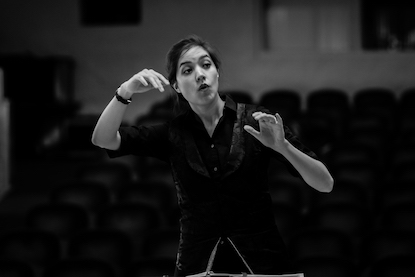Choral Conducting at the Jacobs School
Congratulations to Hana Cai
Winner 2019 ACDA Graduate Student Conducting Competition
DM Student in Choral Conducting at the Jacobs School of Music

A Collaborative, Multi-Faceted Faculty The Choral Conducting Department is dedicated to fostering a supportive environment where students and faculty work closely together to achieve musical excellence.
Podium Time All choral conducting graduate students receive extensive podium time, both in conducting classes and with Jacobs School choral ensembles. Conducting classes are small and meet four days a week. All recitals are performed with a paid chamber chorus or with a major choral ensemble of the Jacobs School. DM students conduct one of their two recitals with a large choir and the Conductors Orchestra, a paid ensemble. MM students conduct a portion of a concert every semester. MM and DM students serve as assistant conductors to the faculty-led choral ensembles and receive opportunities to conduct rehearsals, sectionals, and even works on faculty concerts upon occasion.
Financial Support Graduate students in the MM and DM degree programs for choral conducting are eligible to receive an Associate Instructorship that includes full tuition remission, a stipend, and health benefits. Tuition remission is often available to the occasional student who does not have an assistantship.
Mentoring Our students conduct often and are supported by an unusually strong mentoring program. Faculty members work closely with student conductors on every aspect of their recitals, and attend most rehearsals in order to give on-the-spot feedback throughout the entire rehearsal process.
Opera Chorus Master Training IU offers unique and unprecedented professional training for opera chorus masters within the graduate choral conducting curriculum. Every graduate choral conducting major serves as an assistant or associate chorus master for at least one opera produced by the world-renowned IU Opera and Ballet Theater.
Choral Ensembles The Jacobs School has the widest array of vocal ensembles of any collegiate program in the world: 2 large symphonic choruses, 3 chamber choirs (one of which specializes in new music), 5-6 opera choruses, early music ensembles, a collegiate show choir, an all-campus choir, and a children's chorus. Regardless of your interests, there is a chorus for you at IU!
Frequent Guest Master Teachers Internationally recognized choral leaders come to campus annually to teach master classes. Visitors have included Simon Carrington, Rollo Dilworth, Joseph Flummerfelt, Vance George, Matthew Halls, Ann Howard Jones and Edward Maclary.
Teaching Opportunities Beyond assisting with ensembles, DM students teach classes in undergraduate conducting. All of our Associate Instructors (the IU title for choral assistantships) receive valuable teaching experience as part of their financial aid package.
A Comprehensive Curriculum Graduate students take a full sequence of courses in conducting, choral literature, rehearsal techniques, and score reading, in addition to receiving private lessons with faculty. Students are encouraged to take advantage of the many courses in music theory, music education, and musicology, as well as those available through the university at large. DM students declare two minor fields of study; one can be in an area outside of the School of Music, constructed to reflect your own unique research interests.
An Extraordinarily Rich Musical Environment The scope and depth of musical activities at the Jacobs School are unparalleled in an academic environment, with over 1,000 performances every year-- a musical feast to satiate any appetite. Students are encouraged to attend master classes, observe orchestra rehearsals, and immerse themselves in every aspect of Jacobs School of Music activities, from the New Music Ensemble to the Historical Performance Institute.
A World-Class Music Library This incredible collection includes hundreds of thousands of scores, recordings, books, performance parts, and access to all significant digital research resources about music. The collection also includes the papers of choral doyen Julius Herford.

